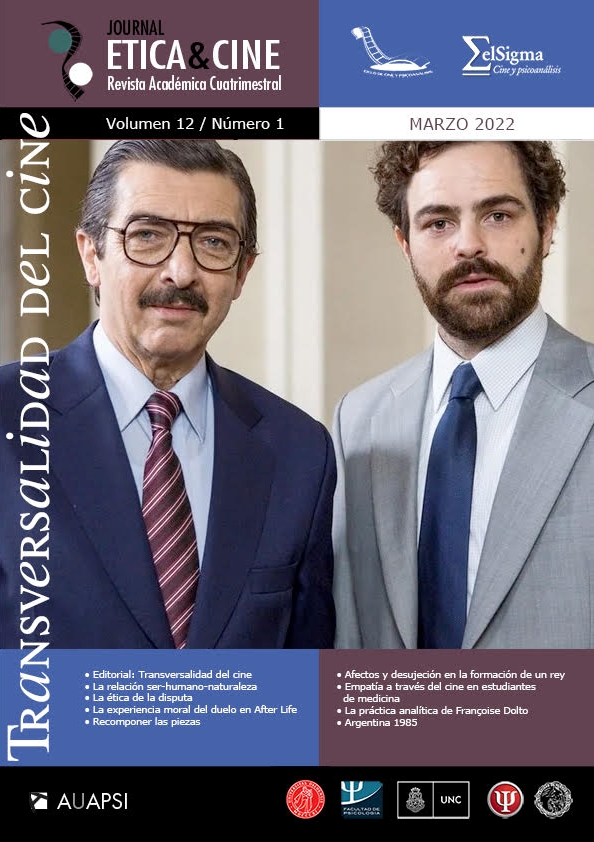The ethics of the dispute. A filmographic analysis of postmarital litigation
DOI:
https://doi.org/10.31056/2250.5415.v12.n1.37378Keywords:
Litigation, Postmaritality, Epistemicide, Argumental vice, Allegation, Alienating ecuationAbstract
As a narrative art and focused on the human condition, cinema recreates (and, at the same time, interrogates) the intricate ways of facing conflict in social life. In this regard, the cinematographic experience can serve as a means of problematizing the ethical implications that derive from a certain style of conversation, discussion and dispute in different areas, including that of the intimate sphere. The heartbreaking drama of postmarital litigation is, in this sense, a revealing theme of the fatal intersection of the private and the public. Oscar Noah Baumbach’s film, Marriage History, exhibits, through the big screen, the complex constitution of a highly expert-cratic alienating equation that ends up colonizing a couple’s decisions about the custody of their child. In this article, I will try to show that the discussions between the couple are permeated by an epistemicidal ethos that traces the legal use of the allegation made by their respective lawyers. Within this framework, arguments impregnated with epistemic vices are raised, with eminently devaluing effects. In light of certain reciprocal positions, the members of the couple (Nicole and Charlie) are encouraged to retell the story of their marriage in ways that legitimize the interests and expectations of the divorce scene. The metaphor of the discussion as a war constrains his explanatory schemes, to the point of turning the former spouse into a staunch enemy. The present filmographic analysis is intended to show the potential of cinema to insightfully pose the philosophical question of disagreement and epistemic autonomy.
References
Christiansen, M. (2017). “Si quieres saber del agua, no le preguntes al pez”. Epistemología de segundo orden en el estudio de la violencia. EIDOS Revista de Filosofía, 26, 93-116.
Christiansen, M. (2020). Parasitismo argumental. El punto muerto de la deliberación. Oxímora. Revista internacional de ética y política, 16 , 50-62. http://revistes.ub.edu/index.php/oximora/article/view/29689/30722
Díaz, M. (2017). Racismo epistemológico y occidentalocentrismo: apuntes para una descolonización de la tradición hegemónica del conocimiento. Revista de Epistemología y Ciencias Humanas, 9, 1-18.
Efran, J. y Lukens, M. (1994). Lenguaje, estructura y cambio. Gedisa
Gergen, K. (1996). Realidades y relaciones. aproximaciones a la construcción social. Paidós Ibérica.
Giuliani, M. (2006). Terapia ipertestuale: nuove metafore postmoderne per la clinica sistemica. Terapia Familiare, (82).
Giuliani, M (2016), Corpi che parlano. Psicoterapia e metáfora, Durango Edizioni.
Krippendorff, K. (1991). The Power of Communication and the Communication of Power; Toward an Emancipatory Theory of Communication. Communication, 12, 175-196.
Krippendorff, K. (1997). Principales metáforas de la comunicación y algunas reflexiones constructivistas acerca de su utilización. En Pakman, M. (1997) Construcciones de la Experiencia Humana vol. II. GEDISA.
Lakoff, G. y Johnson, M. (1980). Metaphors We Live. University of Ch. Press.
Linares, J. L. (comp.) (2015). Prácticas Alienadoras familiares. El “síndrome de Alienación Parental Reformulado”. GEDISA.
Mount, S. (2010). Constitutional topic: due process. Recuperado de www.usconstitution.net/consttop_duep.html
Nardone, G. (2006). Corrígeme si me equivoco. Barcelona: Herder.
Pereda, C. (1994). Vértigos argumentales. Una ética de la disputa. Barcelona: Anthropos & UAM-Iztapalapa.
Pereda, C. (1996). ¿Qué es un buen argumento? Theoria. Segunda Época, 11(25), San Sebastián: Universidad del País Vasco, Pp. 7-20.
Pereda, C. (1999). Crítica de la razón arrogante. México: Taurus-Alfaguara.
Santos, B. y Meneses, M. (2014) Epistemologías del Sur. Perspectivas. Madrid: Akal.
Wittgenstsein, L. (1953). Philosophical Investigations. Nueva York: Macmillan.
Downloads
Published
Issue
Section
License
Copyright (c) 2022 Ética y Cine Journal

This work is licensed under a Creative Commons Attribution-ShareAlike 4.0 International License.
Los autores que publiquen en Ética y Cine Journal aceptan las siguientes condiciones:
Los autores/as conservan los derechos de autor © y permiten la publicación a Ética y Cine Journal, bajo licencia CC BY-SA / Reconocimiento - Reconocimiento-CompartirIgual 4.0 Internacional. La adopción de esta licencia permite copiar, redistribuir, comunicar públicamente la obra, reconociendo los créditos de la misma, y construir sobre el material publicado, debiendo otorgar el crédito apropiado a través de un enlace a la licencia e indicando si se realizaron cambios.

Este obra está bajo una licencia de Creative Commons Reconocimiento-CompartirIgual 4.0 Internacional.




